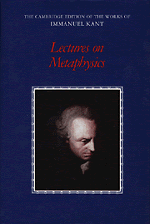Book contents
- Frontmatter
- Contents
- General editors' preface
- Acknowledgments
- Translators' introduction
- Guide to abbreviations and the translators' notes
- I Metaphysik Herder, 1762–1764 (selections) (Ak. 28: 39–53)
- II Metaphysik L1, mid-1770s (complete except for the Natural Theology and Heinze extracts) (Ak. 28: 195–301)
- III Metaphysik Mrongovius, 1782–1783 (complete) (Ak. 29: 747–940)
- IV Metaphysik Volckmann, 1784–1785 (selections) (Ak. 28: 440–450)
- V Metaphysik L2, 1790–1791? (complete except for the Natural Theology) (Ak. 28: 531–594)
- VI Metaphysik Dohna, 1792–1793 (selections) (Ak. 28: 656–690)
- VII Metaphysik K2, early 1790s (selections) (Ak. 28: 753–775)
- VIII Metaphysik Vigilantius (K3), 1794–1795 (complete) (Ak. 29: 943–1040)
- English-German glossary
- German-English glossary
- Latin-German equivalents occurring in the text
- Concordance of Baumgarten's Metaphysics and Kant's Metaphysics lectures
- Explanatory notes (with bibliography of Kant's works cited)
- Name Index
- Subject index
Translators' introduction
Published online by Cambridge University Press: 05 May 2013
- Frontmatter
- Contents
- General editors' preface
- Acknowledgments
- Translators' introduction
- Guide to abbreviations and the translators' notes
- I Metaphysik Herder, 1762–1764 (selections) (Ak. 28: 39–53)
- II Metaphysik L1, mid-1770s (complete except for the Natural Theology and Heinze extracts) (Ak. 28: 195–301)
- III Metaphysik Mrongovius, 1782–1783 (complete) (Ak. 29: 747–940)
- IV Metaphysik Volckmann, 1784–1785 (selections) (Ak. 28: 440–450)
- V Metaphysik L2, 1790–1791? (complete except for the Natural Theology) (Ak. 28: 531–594)
- VI Metaphysik Dohna, 1792–1793 (selections) (Ak. 28: 656–690)
- VII Metaphysik K2, early 1790s (selections) (Ak. 28: 753–775)
- VIII Metaphysik Vigilantius (K3), 1794–1795 (complete) (Ak. 29: 943–1040)
- English-German glossary
- German-English glossary
- Latin-German equivalents occurring in the text
- Concordance of Baumgarten's Metaphysics and Kant's Metaphysics lectures
- Explanatory notes (with bibliography of Kant's works cited)
- Name Index
- Subject index
Summary
PRELIMINARY OVERVIEW
Kant was eloquent about the centrality of metaphysics in his view of philosophy: “Metaphysics is the spirit of philosophy. It is related to philosophy as the spirit of wine [spiritus vini] is to wine. It purifies our elementary concepts and thereby makes us capable of comprehending all sciences. In short, it is the greatest culture of the human understanding” (Ak. 29: 940).
These words are from the end of the Metaphysik Mrongovius, perhaps the most significant of the sets of student notes from Kant's lectures that are being translated here for the first time. Given the importance of metaphysics in Kant's system, it must seem remarkable that it has taken so long for his lectures on metaphysics to see the full light of day. Although notes from his lectures were widely used and distributed during his lifetime, only parts of two sets of lectures on metaphysics were published (by Pölitz) in the first half century after Kant's death. Parts of a few other sets were reproduced by other editors within the next hundred years, and in the 1920s philosophers such as Heinz Heimsoeth and Martin Heidegger made a strong case that Kant's traditional metaphysical concerns remained central even throughout his Critical period. Nonetheless, it was not until 1968 and 1970 that versions of these lectures appeared in the Academy edition of Kant's works, and they were seldom cited by scholars, let alone reviewed or discussed at length.
- Type
- Chapter
- Information
- Lectures on Metaphysics , pp. xiii - xlivPublisher: Cambridge University PressPrint publication year: 1997



